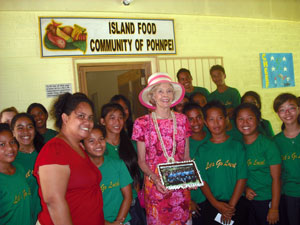The production and consumption of local food in the Federated States of Micronesia is decreasing. More and more, Micronesians have been neglecting traditional food crops in favour of refined, processed and imported foods. Although local foods are still widely available throughout the country, heavily processed alternatives are often quicker and easier to prepare. They are also generally higher in saturated fats and sugar, and lack the nutrients needed to maintain a healthy diet. And they are having devastating consequences on the health of the population.
High occurrences of diabetes, vitamin A deficiency disorders and other non-communicable diseases have been present in the Federated States of Micronesia for some time. Over half the children in the country have a vitamin A deficiency, meaning they are vulnerable to infection, night blindness and anaemia.
Obesity is also a major concern among the Micronesian population. In recent years, this small Pacific island country has been identified as one of the most overweight in the world, leading to an increase in lifestyle illnesses. In fact, one in three adults in the capital of Pohnpei have diabetes. Diabetes can have serious impacts on quality of life, potentially leading to amputations, infections and loss of sight, as well as being an increasing cause of early deaths.
With AusAID's support, local non-government organisation Island Food Community of Pohnpei [external link] has been helping to combat this rise in diseases by bringing the focus back to local produce and promoting healthy living. The organisation has been working with communities throughout the Federated States of Micronesia to promote nutritious varieties of local food crops, such as bananas and giant swamp taro. These foods are readily grown, provide rich sources of provitamin A carotenoids, vitamin B2 (riboflavin), minerals and fibre – and help protect against vitamin deficiencies, diabetes, heart disease and anaemia.
Island Food Community of Pohnpei's dedicated team have been motivating local farmers to sustainably increase production of these nutrient-rich crops for use in the home and sale at local markets. Their philosophy focuses on the CHEEF principle – that is, the benefits associated with Culture, Health, Economics, Environment and Food security that locally-grown food can bring.
The initial success of Island Food Community of Pohnpei's work has prompted widespread interest from many remote communities wanting to learn more about local solutions to lifestyle illnesses. By partnering with AusAID through a small grants scheme, the organisation has been able to extend its services throughout the Federated States of Micronesia to reach people across the country.
Through the AusAID-funded project, Island Food Community of Pohnpei carried out community workshops and used mass media to reach all age groups – from adults to young children – on the importance of nutritious, locally-grown food. As young people are still forming their eating habits, it is essential that they are aware of the relationship between good food and good health.

